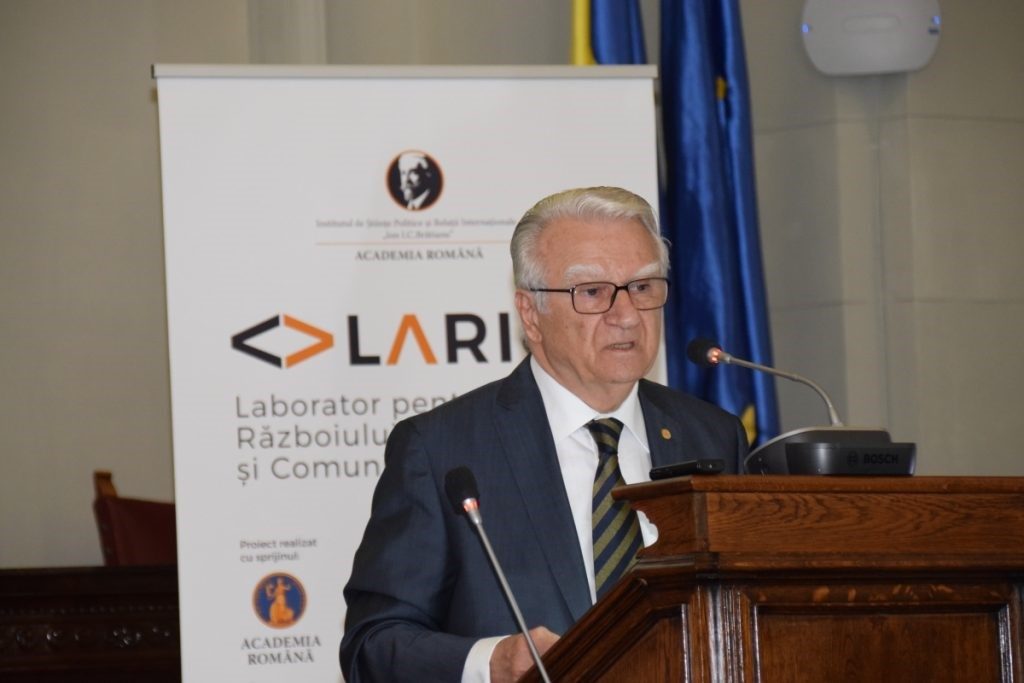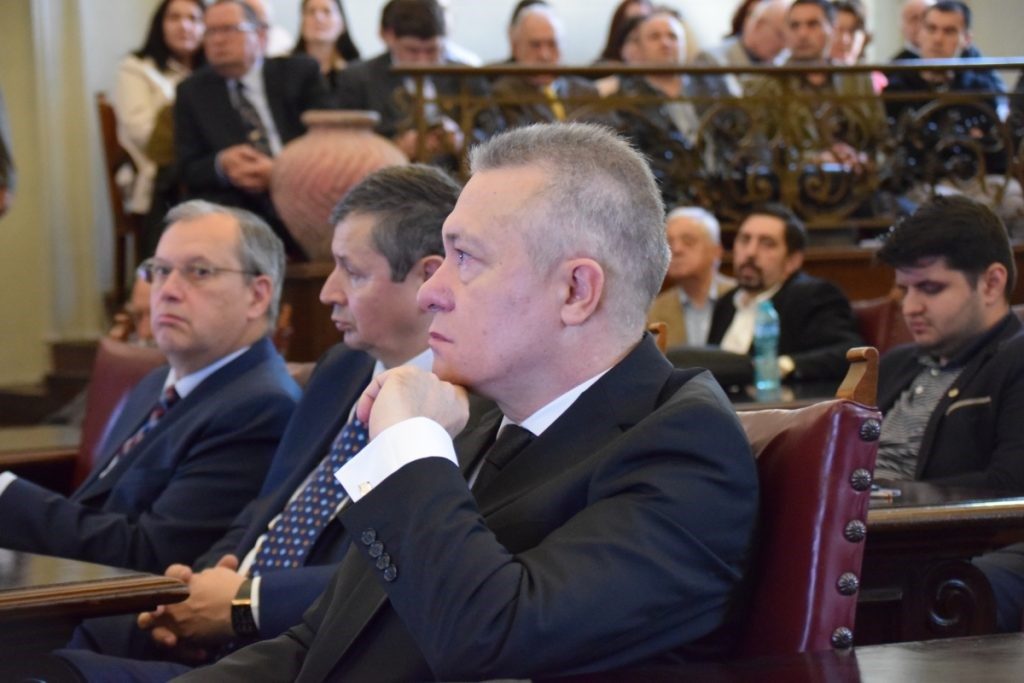by ACAD. Victor Voicu*

LARICS – Romanian acronym for the Think Tank of Information War Analysis and Strategic Communication – represents a success story of Ion I.C. Bratianu Institute of Political Science and International Relations, an institute which has been part of the Romanian Academy. I congratulate prof. Dan Dungaciu, and all his colleagues and collaborators for this achievement, an achievement both necessary and symbolic for our times.
In a world where neglect and indifference dominate the chronic problems of Romanian society, whether identified or not, the emergence of such a structure within an institute of the Romanian Academy represents a sign of the revival of hope in our own lucidity. The world, Europe, and our nation are not going through a period in which optimism and safety, both medium- and long-term, are not a given. The aggressive manifestation, of some of our neighbors, place Romania in potential danger — and to some extent the bountiful project of the European Union.
We would be very naive – and we are not! – to believe that these neighbors do not eagerly wish to dismantle the European Union, to reach their own political and expansionist goals. Even though in their primitivism, these neighbors – I am referring to Putin’s Russia – resort, according to a historical tradition, to armed threats, lacking decency, at least the diplomatic one, this is not the greatest danger. A well-organized, dissimulated propaganda, and with a global cover and dispersion, manipulating large masses of citizens with false information and defamation, propagating the greatness of Vladimir Putin, hailing particular candidates for the leadership of European nations, and even more than that!
LARICS has identified and analyzed Russia’s troll army – or as others prefer to call it, Kremlin’s troll army. Capital for paying journalists, bloggers, online commentators asserted to pro-Putin, anti-Western, anti-EU, and anti-NATO propaganda reach a budget of 5-7 billions of dollars. There are relevant journalistic investigations on this type of pro-Kremlin activity, coordinated by the Russian Federal Services of Security (FSB), data also published by the Guardian in 2015. Extensive data are constantly being published by LARICS, under the signature of Elena Onu, on Adevarul.Ro, a Romanian journalistic and blogging platform. Manipulation of public opinion through online messages, articles, comments, movies, various messages concerns any domain of national interest. Utterances of template phrases and persistent repetition of these have the goal of “shaping” public opinion perception, e.g., the perception of the conflict in Ukraine. The publishing of a relevant report, by the Finnish Institute of International Affairs, titled “Fog of Falsehood: Russian Strategy of Deception and the conflict in Ukraine,” has proven, among other things, the intensive promotion of some ideological theses typical to the Soviet era. It is evident that the process is extremely dangerous with regards to the manipulation of younger generations, without any experience with direct communist propaganda, particularly penetrating.
There is a clear-cut aggressivity toward different opinions, toward free speech. Let’s not forget the reactions of some pseudo-leaders of opinion toward the Academicians’ call. We have committed, from their perspective, a thought crime although on many media outlets the aggravating problems, which Romanian society is facing, are most times presented realistically and without retraction. At a European and national level, it is a fraud if you hold other opinions about LGBT, family, and immigration, than the ones accepted by the politically correct elite. You are treated as an anti-Westerner, anti-democrat, etc. This includes ethnic minorities, too. The status of Szeklerland has been issued in the Official Gazette of Romania… It imposes not equality, but minority dominance and majority obedience.
In one of LARICS’s analysis, this very subject is tackled. Among others, the author, George Scarlat, proves that communication services and press offices do not make background analyzes and that Romania is vulnerable in the face of the information war. Relevant here is the lack of discernment of the Romanian press and the behavior as an amplifier of anti-Romania campaigns. The mentioned author also analyzes the press’s provincialism — including Romanian politicians — targeting the infallibility of Western media. Quite relevant is the “identitarian war” in the Republic of Moldova, characterized by a few phrases and deliberated confusions. The Moldavian census has brought to the public’s attention the fact that in the nationality rubric it wrote “Republic of Moldova.” The phrase “civic nation” has appeared, being used by political and opinion leaders from Moldova, eluding the fact that “the Republic of Moldova” has made its appearance in the name of some identitarians determinants, first of all in the Romanian language! That means ethnic claims, not civic ones, as the author, Dan Dungaciu, highlights in the article. Manipulation appearing on a poster becomes ludicrous: “We speak Moldavian.” Might this be a convincing message to some? Dan Dungaciu quotes Thomas’s theorem: a false fact, perceived as real, becomes real by consequences.
Concerning protests in Victory Square, the Russian media, issuing the short message of the Russian minister of Foreign Affairs, has developed its targets to illustrate “what is happening in the nation that wanted to unite with the neighboring country, Moldova.” The identified topics were, among others, the protest’s violence, country division, Romanian maidan, economic situation, anti-Russian sentiments, and the fact that the European Union does not help Romania, NATO and Romania, the Russian minister of foreign affairs about the danger represented by Romania. It is obvious the discrepancy between the reality of the events and the messages of the Russian propaganda.
The propaganda project “Moldova is not Romania,” relevantly presented by George Damian, although having many errors, captures our attention through his anti-Romanian aggressivity. Among others, he insists that the Republic of Moldova is being besieged by Romania… Examples are numerous, but this is not the only problem that needs to be identified. Russia develops an ample propaganda, intense, on multiple channels.
Of course, the problem needs to be tackled, but not just anyway would do. We, the Romanian Academy – together with the Ion I.C. Brătianu Institute of Political Science and International Relations — have founded a competent structure, capable of identifying and taking action. It is admitted that anti-Romanian propaganda, and not only, is correlated with the trust crisis in institutions and values of the Romanian society. This type of crisis evidentially manifests also at higher levels (Europe, USA, etc.). The nurtured lack of trust within is what undermines the Romanian society and amplifies the efficiency of this propaganda. The lack of trust and belittlement of Romanian values are efficient weapons on a medium term. It is difficult to me not to recall the Biblical truth about the collapse of the temple using tools crafted within it. Or our national anthem: Awaken thee, Romanian, shake off thy deadly slumber/ The scourge of inauspicious barbarian tyrannies/ And now or never to a bright horizon clamber/ That shall to shame put all your enemies. A distinguished man of culture, the writer Florentin Popescu, wrote, in the South magazine (Gazeta de Sud in Romanian), “… I wonder if the barbarian tyrannies are only from outside the country, or are there others within it…”
A fascinating analysis is signed by Cristian Barna and Cosmin Dugan, in the sphere of neuropsychic mechanisms of population manipulation through very diverse means, from rumors in the medical field, psychotropic substances, motivational manipulation with money, rewards, blackmail, ideology, economic or political privileges. Using the national “rebels,” hard to distinct from mercenaries, delinquents, psychopaths, makes neuroscience a domain of military interest, whose developments could be a potential target concerning hybrid wars.
I would like to suggest, thus, that we should take into consideration the internal hybrid war, too — of Romanians against Romanians. I would like to state some aspects that are also commented in the media, without much relevance, being easily placed in a secondary place by political events. In essences, I want to reveal press and internet campaigns against the Romanian Orthodox Church, Romanian Academy, traditional family, against the Romanian values, of people of culture, of writers, be they from the past or still alive today, against Romanian doctors, and finally, against national identity (as were the reactions of an unexpected aggression against the Appeal of over 100 academics.).

The question is, are these aggressive campaigns spontaneous or are they launched in conformity with some pre-established plan? What drives the organizers into this fight? Before approaching the suggested issue briefly, I would like to evoke the elegant and responsible reactions of some influential people of culture, in various publications.
Very relevant, as a reaction toward the discussed campaigns, is, in my opinion, Ms. Ana Blandiana’s discourse at Babes-Bolyai University, Paul Ghitiu’s articles, prof. Mircea Martin, articles from Contemporanul of Mr. and Ms. Theodor Codreanu, Mircea Platon, Magda Ursache, Horia Patrascu and Bogdan Cretu. Or The Hunt of Great People from the volume Home in Exile by Aura Christi, editor-chief of the he Contemporanul Journal.
I would like to quote Theodor Codreanu. “Here he comes, Nicolae Breban, to offer us a new Romanian construction, approaching the same Eliade theme from 1954, with tremendous force and an exceptional philosophy. Why does he do it just now, when the Romanian elites, indoctrinated by political correctness are convinced that, since a quarter of a century, Romania lives in a paradise of democratic freedoms? From the simple motive that, at first hand, in spite of the mannered blind hens, it is showed that Romania has remained an anvil, that no revolutionary upheaval took place and that the country has gone under the sweetened blows of an invisible, globalist, thousands of times more cunning and ruthless than the Bolshevik monster. But a creepy symptom: after Syria, Romania is the country on earth with the largest population exodus of over four million hits. ”
I have read in an overview concerning the psychological manipulation campaign with different targets (influencing elections, favoring Brexit and other events with a major impact), the experiment of the young Michael Kosinski, specialist in psychometric. He has developed a Facebook app, “My personality,” in which users are put to complete psychometric questionnaires targeting their own psycho-behavioral peculiarities. To the author’s surprise, millions of users have revealed their most intimate peculiarities and beliefs. The model has been improved, allowing predictions of behaviors through simulations. In fact, it turns out that a search engine of people has been invented! This is the main activity of the Cambridge Analytica” company, ” a company led by Alexandru Kogan (Dr.Spectre). Facebook turned out to be a gold mine!
I tried to suggest some aspects which concern us in the Romanian society, a society brought in a place without a purpose on the medium- and long-term. This lack of vision, without a compass, without any values, a state generated, induced, not by accident, should worry us. Ethological analyzes on the socio-moral mobiles and dissimulated mechanisms, insidious and persevering, on a one-or-two-term generation, are disastrous for a people. The test recently managed by the Romanian Academy shows that what seemed impossible 25 years ago, as a type of aggressive reaction toward opinions concerning aggravating realities of the Romanian society it was made possible now. By similarity, I evoke another episode. Dan Dungaciu and Petrisor Peiu wondered in a recent analysis, if, today, could be possible, Bessarabia’s action from 99 years ago – on March 27, 1918 – to take the first step, finished with the historical and shiny and unique moment of December 1, 1918 – the Great Unification?
Of course, another reason for deep reflection!
* ACAD. Victor Voicu is the Secretary General of the Romanian Academy. The text was presented at the opening of LARICS’s launching conference in the Aula of the Romanian Academy, April 26, 2017.
